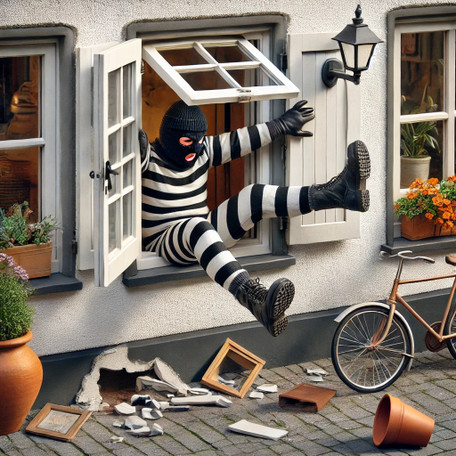How To Keep Your Home Safe While On Vacation
Aug 01, 2024
How to Keep Your Home Safe While on Vacation
Vacation is a time to relax, unwind, and escape the daily grind. However, leaving your home unattended can raise concerns about its safety. Here are comprehensive strategies to ensure your home remains secure while you enjoy your time away.
1. Home Security Systems
Investing in a robust home security system is one of the most effective ways to protect your home. Modern systems offer a range of features, including:
- Alarms and Sensors: Door and window sensors trigger alarms if unauthorized entry is detected.
- Surveillance Cameras: Install cameras both inside and outside your home. Many modern systems offer remote viewing through your smartphone.
- Smart Locks: These allow you to control your door locks remotely, providing an additional layer of security.
- Motion Detectors: These sensors can alert you or trigger alarms when motion is detected in specific areas.
Ensure your security system is in good working order before you leave, and notify your security company of your absence.
2. Smart Home Devices
Smart home technology can greatly enhance your home’s security. Consider these options:
- Smart Lights: Program these to turn on and off at random intervals to create the illusion of someone being home.
- Smart Plugs: These can control various devices remotely, such as radios or TVs, to make it seem like someone is in the house.
- Video Doorbells: These not only allow you to see and speak with visitors remotely but also record activity around your front door.
3. Neighborhood Watch
Inform trusted neighbors about your travel plans. They can keep an eye on your property and report any suspicious activity. Consider joining or forming a neighborhood watch group to foster a community-based security network.
4. Mail and Deliveries
A pile of uncollected mail is a clear sign that no one is home. Arrange for your mail to be held at the post office or ask a neighbor to collect it for you. Similarly, pause any newspaper deliveries and reschedule any expected packages.
5. Yard Maintenance
An unkempt lawn can signal to potential burglars that the house is vacant. Arrange for someone to mow your lawn and maintain your garden if you’ll be away for an extended period. If it's winter, ensure someone is available to clear snow from your driveway and walkways.
6. Secure Windows and Doors
Before you leave, double-check that all windows and doors are securely locked. This includes basement windows, patio doors, and garage doors. For added security:
- Install Deadbolts: These provide a higher level of security compared to standard locks.
- Use Security Bars: Place these on sliding doors and windows to prevent them from being forced open.
- Window Locks: Ensure all windows have locks, especially those on the ground floor.
7. Timers for Lights and Electronics
Use timers for lights, radios, and televisions to create the impression that someone is home. Set them to turn on and off at various times in different rooms to mimic typical household activity.
8. Social Media Discretion
Avoid posting your travel plans on social media until you return. Broadcasting your absence can inadvertently inform potential burglars that your home is unattended.
9. Valuables and Documents
Store valuables and important documents in a safe or safety deposit box. Avoid leaving them in plain sight or easily accessible areas. Consider the following steps:
- Inventory Valuables: Keep a list of valuable items, including serial numbers and photographs.
- Engrave Identifiers: Mark valuables with an identification number to make them less attractive to thieves and easier to recover if stolen.
10. Lighting and Landscape
Proper outdoor lighting can deter burglars. Install motion-sensor lights around your property, focusing on entry points like doors and windows. Additionally, maintain your landscaping to eliminate hiding spots:
- Trim Shrubs and Trees: Ensure windows and doors are visible from the street.
- Clear Obstructions: Remove any potential hiding places for intruders.
11. Alarm Signs and Stickers
Visible signs of a security system can deter potential burglars. Place alarm company signs and stickers around your property to indicate that your home is protected.
12. Automated Home Monitoring
Consider using automated home monitoring services. These can include:
- Remote Access: Control your home security system, smart devices, and check live camera feeds from your smartphone.
- Alerts and Notifications: Receive instant alerts for any unusual activity, such as motion detection or door openings.
13. Hide Spare Keys Wisely
Avoid leaving spare keys in obvious places like under the doormat or in a flower pot. Instead, leave a key with a trusted neighbor or use a secure key lockbox.
14. Curtains and Blinds
Decide whether to leave curtains and blinds open or closed. Leaving them open can make it obvious that no one is home if there’s no activity, while closing them completely can look unnatural. A balanced approach is to leave them partially open or use sheer curtains.
15. Inform Your Alarm Company
If you have a monitored alarm system, inform your alarm company of your travel plans. Provide them with emergency contact information and ask them to respond promptly to any alarms during your absence.
16. Emergency Contacts
Provide a trusted friend or neighbor with your contact information and itinerary. Ensure they know how to reach you in case of an emergency.
17. Insurance Check
Review your home insurance policy before you leave. Ensure it covers theft and damage while you’re away. Update your inventory of valuables and keep it with your policy documents.
18. Backup Power
Consider a backup power source for essential security systems. A power outage can disable alarms and cameras, so having an uninterruptible power supply (UPS) or generator can ensure continuous operation.
19. Garage Security
Garages can be an entry point for burglars. Ensure your garage door is secure and consider the following tips:
- Disconnect Automatic Openers: This prevents burglars from using universal remotes to open your garage.
- Lock Interior Doors: If your garage is attached, lock the door leading into your home.
- Cover Windows: Use frosted or covered windows to obscure the contents of your garage.
20. Local Authorities
Inform local authorities of your absence if you’re leaving for an extended period. Some police departments offer vacation watch services, where they will periodically check on your home.
21. Pet Safety
If you have pets, make arrangements for their care. Whether they stay at home with a pet sitter or in a boarding facility, ensure they are safe and their caretakers are aware of your home’s security measures.
22. Emergency Plans
Prepare for emergencies by leaving detailed instructions for trusted individuals. This can include:
- Location of Water and Gas Shutoff Valves: In case of leaks.
- Electrical Panel: For handling power issues.
- Emergency Contacts: Including your insurance company and a local contractor.
Conclusion
Ensuring your home’s safety while on vacation involves a combination of technology, community, and preparation. By implementing these strategies, you can significantly reduce the risk of burglary or damage, allowing you to enjoy your vacation with peace of mind. Remember, the key to effective home security is planning and vigilance, even when you’re not there to oversee it directly.




